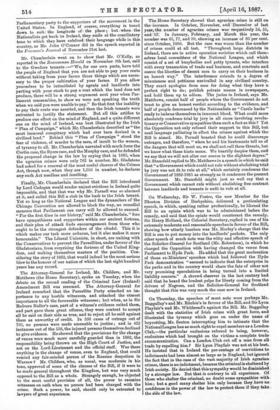Mr. Chamberlain went on to show that Mr. O'Kelly, as
reported in the Roscommon Herald on November 9th last, said Mr. Chamberlain went on to show that Mr. O'Kelly, as reported in the Roscommon Herald on November 9th last, said to the Gwedore tenants :—" We, for our own parts, have told the people of England that you are not able to pay your rents without taking from your farms those things which are neces- sary to the proper cultivation of your farms. If you allow yourselves to be intimidated by agents and landlords into parting with your stock to pay a rent which the land does not produce, there will be a strong argument next year when Par- liament reassembles, to show we were not speaking the truth when we said you were unable to pay." So that first the inability to pay their rents was asserted, and then the Irish tenants were entreated to justify the statement. But all this artifice to produce one effect on the mind of England, and a quite different one on the mind of Ireland, was best illustrated by the Irish "'Plan of Campaign," which Mr. Chamberlain described as " the most immoral conspiracy which had ever been devised in a civilised land." Behind this "Plan of Campaign" stood the fear of violence, of murder to the men, of insult to the women, of tyranny to all. Mr. Chamberlain narrated with much force the Curtin case, the Byers ease, and the Murphy case, and he defended the proposed change in the law by saying that in 1885, when the agrarian crimes were only 762 in number, Mr. Gladstone had asked for a renewal of the most useful clauses of the Crimes Act, though now, when they are 1,056 in number, he declares any such Act needless and insulting.


































 Previous page
Previous page